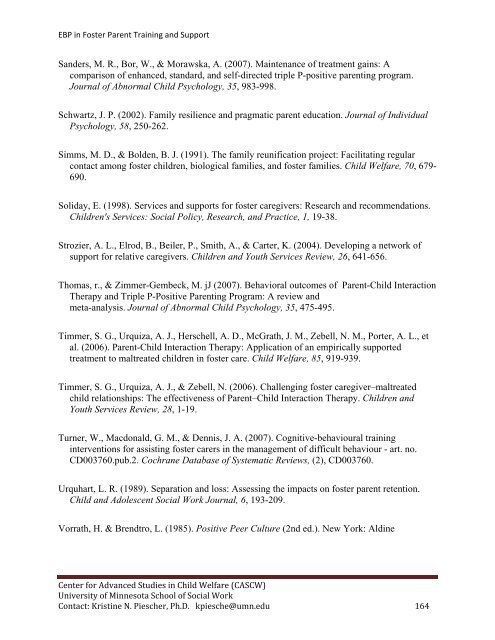Evidence-Based Practice in Foster Parent Training and Support ...
Evidence-Based Practice in Foster Parent Training and Support ...
Evidence-Based Practice in Foster Parent Training and Support ...
Create successful ePaper yourself
Turn your PDF publications into a flip-book with our unique Google optimized e-Paper software.
EBP <strong>in</strong> <strong>Foster</strong> <strong>Parent</strong> Tra<strong>in</strong><strong>in</strong>g <strong>and</strong> <strong>Support</strong>S<strong>and</strong>ers, M. R., Bor, W., & Morawska, A. (2007). Ma<strong>in</strong>tenance of treatment ga<strong>in</strong>s: Acomparison of enhanced, st<strong>and</strong>ard, <strong>and</strong> self-directed triple P-positive parent<strong>in</strong>g program.Journal of Abnormal Child Psychology, 35, 983-998.Schwartz, J. P. (2002). Family resilience <strong>and</strong> pragmatic parent education. Journal of IndividualPsychology, 58, 250-262.Simms, M. D., & Bolden, B. J. (1991). The family reunification project: Facilitat<strong>in</strong>g regularcontact among foster children, biological families, <strong>and</strong> foster families. Child Welfare, 70, 679-690.Soliday, E. (1998). Services <strong>and</strong> supports for foster caregivers: Research <strong>and</strong> recommendations.Children's Services: Social Policy, Research, <strong>and</strong> <strong>Practice</strong>, 1, 19-38.Strozier, A. L., Elrod, B., Beiler, P., Smith, A., & Carter, K. (2004). Develop<strong>in</strong>g a network ofsupport for relative caregivers. Children <strong>and</strong> Youth Services Review, 26, 641-656.Thomas, r., & Zimmer-Gembeck, M. jJ (2007). Behavioral outcomes of <strong>Parent</strong>-Child InteractionTherapy <strong>and</strong> Triple P-Positive <strong>Parent</strong><strong>in</strong>g Program: A review <strong>and</strong>meta-analysis. Journal of Abnormal Child Psychology, 35, 475-495.Timmer, S. G., Urquiza, A. J., Herschell, A. D., McGrath, J. M., Zebell, N. M., Porter, A. L., etal. (2006). <strong>Parent</strong>-Child Interaction Therapy: Application of an empirically supportedtreatment to maltreated children <strong>in</strong> foster care. Child Welfare, 85, 919-939.Timmer, S. G., Urquiza, A. J., & Zebell, N. (2006). Challeng<strong>in</strong>g foster caregiver–maltreatedchild relationships: The effectiveness of <strong>Parent</strong>–Child Interaction Therapy. Children <strong>and</strong>Youth Services Review, 28, 1-19.Turner, W., Macdonald, G. M., & Dennis, J. A. (2007). Cognitive-behavioural tra<strong>in</strong><strong>in</strong>g<strong>in</strong>terventions for assist<strong>in</strong>g foster carers <strong>in</strong> the management of difficult behaviour - art. no.CD003760.pub.2. Cochrane Database of Systematic Reviews, (2), CD003760.Urquhart, L. R. (1989). Separation <strong>and</strong> loss: Assess<strong>in</strong>g the impacts on foster parent retention.Child <strong>and</strong> Adolescent Social Work Journal, 6, 193-209.Vorrath, H. & Brendtro, L. (1985). Positive Peer Culture (2nd ed.). New York: Ald<strong>in</strong>eCenter for Advanced Studies <strong>in</strong> Child Welfare (CASCW)University of M<strong>in</strong>nesota School of Social WorkContact: Krist<strong>in</strong>e N. Piescher, Ph.D. kpiesche@umn.edu 164
















